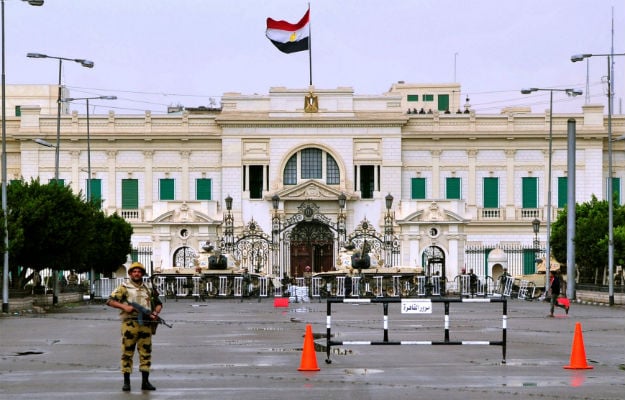 To coup or not to coup? Who cares? Whatever label it is being given, coup or revolution, what the Egyptian military accomplished less than one week ago is removing a government supposedly democratically elected. This comes on the heels of a previous removal of a long-standing dictator — Hosni Mubarak — just over two years ago. Granted, Mohammed Morsi and his cronies had little time for secularists and Christians, as they entrench themselves into a dictatorship by majority. However, with the violence over the past week and the protests nearly countrywide, the world watches and waits to see if this interim regime, backed and supported by the military will corral the slew of emotions from the various factions, or watch the whole thing explode in their face.
To coup or not to coup? Who cares? Whatever label it is being given, coup or revolution, what the Egyptian military accomplished less than one week ago is removing a government supposedly democratically elected. This comes on the heels of a previous removal of a long-standing dictator — Hosni Mubarak — just over two years ago. Granted, Mohammed Morsi and his cronies had little time for secularists and Christians, as they entrench themselves into a dictatorship by majority. However, with the violence over the past week and the protests nearly countrywide, the world watches and waits to see if this interim regime, backed and supported by the military will corral the slew of emotions from the various factions, or watch the whole thing explode in their face.
As a passive observer from afar I have watched the Egypt revolution and hoped that inevitably the people’s rights will be recognized and a compromise between seculars and extremists could be negotiated at some point, but now, I don’t see it. Five months ago I wrote an article following the Port Said soccer riots inferring that Egypt may be headed for a bloody revolution. I stand by this sentiment as all of the pieces are in place for such a tragic war to breakout.
Right now, the ultimate fate of Egypt stands as a thumb wrestle between dissatisfied and unemployed youth and a conservative Islamic group that has vied for control since its onset. Curiously, the killing of 51 Morsi and Muslim Brotherhood supporters did not prompt more of an outrage on the international stage. It in fact had the reverse affect, as the interim government seems poised to eliminate the Brotherhood from any sort of retaliation, ordering the arrest of several leaders, including their spiritual leader, Mohamed Badie.
The Brotherhood and its base will not go quietly, insisting that their democratically elected leader needs to be reinstated. This is obviously wishful thinking, but they may have the support to make noise. Any group that garnished a significantfollowing from the masses in the Arab world’s largest country will be able to rally a portion of those supporters to their cause.
The turmoil surrounding the region over the last two years is no help either. With the fall of Gaddafi, Libya has become a centrifuge for weapon trafficking and Islamic extremists. The recent insurgencies in both Nigeria and Mali have shown that North Africa is a hotbed for harboring groups that could ignite the unrest in Egypt, sending it over the edge.
The military remains Egypt’s biggest wildcard. While they have been the main players in both revolutions over the last few years, the question of their agenda comes to the forefront of any upcoming negotiations or democratic elections. While many Egyptians are not calling this a coup, the fact that the military forcibly deposed any leader makes them a major player in any future government. Having the power to remove two leaders in a small amount of time displays a very dangerous power that leaves the military with the final say in who governs the nation, not the people.
None of this has even taken into account the real reason the Arab Spring ignited in the first place, the economic shortcomings for an extremely young and unemployed population. With half of the population under the age of 24, and a high unemployment rate, especially for this demographic, there are a lot of youths that have nothing to occupy their time and simply want change now. While many of these young people have been unable to participate in the democratic process or have simply been ignored, they represent one of the more powerful factions in a country divided. Economic deficiencies cannot be solved overnight, but some sort of real resolution must be reached or the unhappiness of this group will become a perpetual pattern of dissatisfaction and protests in Tahrir Square.
Inevitably, all of these different aspects of what has occurred in Egypt in the last week have the potential to reach a boiling point. What if the military powers refuse to give up power the second time? What if Brotherhood supporters seek the assistance of Islamic extremists? What if the next round of elections sees a nation so divided that polling stations become sparks for violent outbreaks? All of these incidents could be a catalyst that plunges the country into civil war. And with a population that is four times larger than Syria and a military that holds more advanced weaponry, the consequences could be catastrophic for the people and the region.
In the end, hopefully some semblance of the democratic process wins out and the newly formed government instills some significant strategies to tackle the nation’s economic woes, but this would be an ideal scenario and one that has never played out in Egypt during the course of its existence. Unfortunately the more likely path is to go the way of Syria and plunge into a long and bloody civil war.